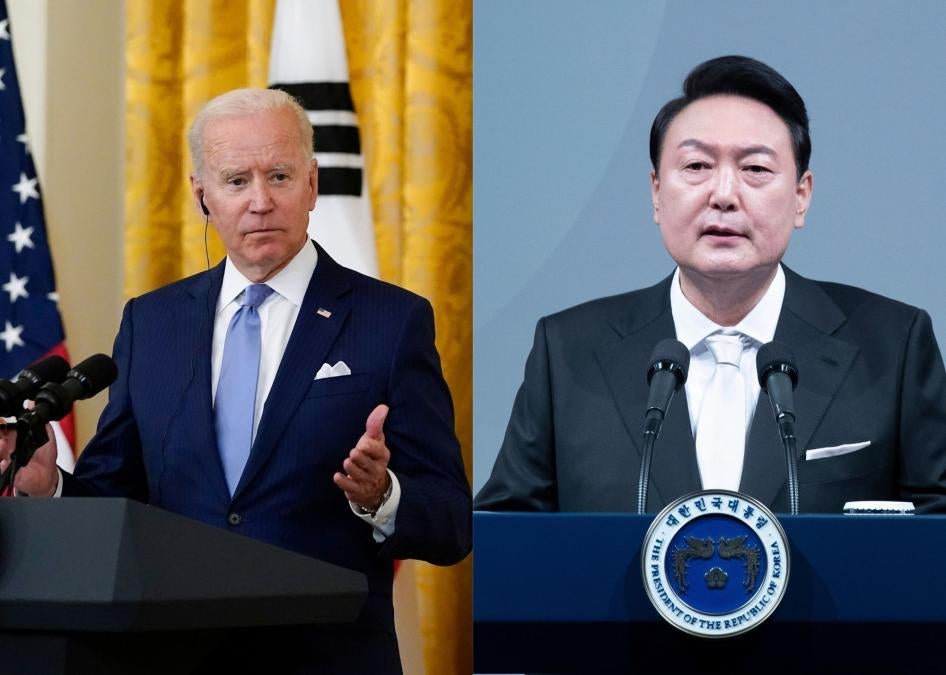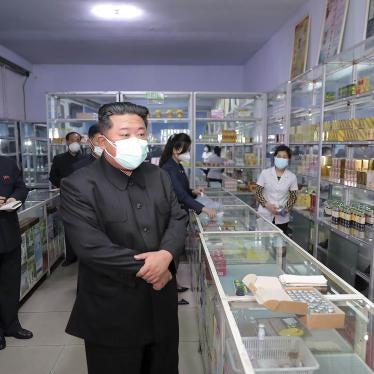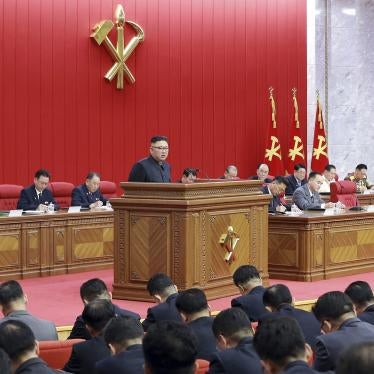(Seoul) – US President Joseph Biden and newly elected South Korean President Yoon Suk Yeol should pledge to include human rights benchmarks in future negotiations with North Korea, Human Rights Watch said today. Biden is visiting South Korea on May 20, 2022, and will meet with Yoon to discuss economic and security issues, including North Korea’s growing nuclear weapon capacities.
“The United States and South Korea have for too long viewed the situation in North Korea primarily through the lens of North Korea’s nuclear weapons development,” said Lina Yoon, senior Koreas researcher at Human Rights Watch. “It’s crucial for negotiations with North Korean leader Kim Jong Un to address the country’s human rights and humanitarian crisis.”
Weapons proliferation issues cannot be separated from human rights concerns, Human Rights Watch said. The North Korean military depends on widespread forced labor and a massive diversion of government resources from basic human needs for arms development. US law makes broad sanctions relief for North Korea contingent on human rights improvements, and counter-proliferation experts have acknowledged that successful monitoring of weapons agreements requires more general reforms by the North Korean government.
The US and South Korea should also increase efforts at the United Nations Security Council to hold new debates on the human rights situation in North Korea.
Biden and Yoon should also discuss humanitarian outreach to the North Korean government and how to provide assistance to address the country’s deteriorating economic and humanitarian situation and recently reported Covid-19 outbreak, Human Rights Watch said.
Since early 2020, North Korea has been imposing unnecessary and extreme restrictions that tighten government control over its northern border with China and Russia, the domestic movement of people and products, and information.
“The North Korean government has used Covid-19 restrictions to further oppress its people and restrict commercial activity and freedom of movement, creating a crisis over access to food, medicine, and other essential goods,” Lina Yoon said. “The UN and governments around the world should encourage North Korea to accept offers of monitored deliveries of food, medicine, vaccines, and the infrastructure to preserve and distribute vaccines.”
In August 2020, North Korea’s leadership responded to the pandemic by creating “buffer zones” on the border with China and Russia, and ordered soldiers to “unconditionally shoot” on sight anybody entering without permission. The government banned nearly all international travel.
It also blocked almost all official and unofficial trade, and limited domestic travel to the movement of essential personnel and goods, imposing almost de facto provincial lockdowns. As a result, food and other essential goods were kept from entering the country, and the capacity to move products internally decreased, causing shortages of basic necessities.
As up to 80 to 90 percent of products sold in North Korean markets are from China, many people lost the ability to make money. Many products, like medicines, cooking oil, or spices, are either not available, or in some cases, prices have gone up 10, 20, or 30 times, several people with contacts in North Korea told Human Rights Watch.
Pyongyang, to prevent dissent and to stop communication with the outside world, adopted a new law in December 2020 that bans distribution of media originating from South Korea, the United States, or Japan, punishable by long prison terms and possibly the death penalty.
North Koreans have had almost no access to the Covid-19 vaccine, as the North Korean government rejected several offers of vaccines. Many North Koreans are also chronically malnourished, leaving them with compromised immune systems. Medicines of any kind are scarce in the country, and the healthcare infrastructure is extremely fragile, lacking medical supplies, such as oxygen and other Covid-19 therapeutics.
North Korea’s meager economy has significantly contracted in recent years due to lockdowns, border closures, and intensifying UN Security Council sanctions. The current nationwide lockdown can be expected to hinder the agricultural harvest, already impacted by drought, which is crucial for the country’s economy. The extent of North Korea’s humanitarian crisis is unknown, as virtually all international aid providers pulled out of the country during earlier lockdowns.
In 2021, the Food and Agricultural Organization estimated that North Korea would face a gap between available and needed food in 2022 of over one million tons. UNICEF, the UN children’s fund, previously estimated that only one in three North Korean children receive a minimally adequate diet, and one in five are stunted due to malnutrition. In 2020, the US Department of Agriculture estimated that more than 15 million North Koreans, almost 60 percent of the population, were food insecure meaning that more than half of the population was expected not to have enough food to eat, or would suffer from uncertain access to food. Those figures were calculated before the border closures and lockdowns.
“The US and South Korea should urgently try to persuade North Korea to allow outside humanitarian assistance and accept offers of aid,” Lina Yoon said. “North Koreans are facing a uniquely acute catastrophe, and the world should make every effort to address it.”









